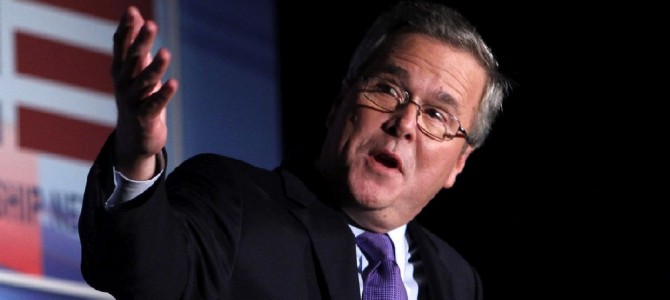Former Florida Governor Jeb Bush announced on Facebook that he has “decided to actively explore the possibility of running for President of the United States.” While the news excited the Washington crowd of media, consultants and lobbyists, reception among others was decidedly mixed. There are many problems with the candidacy, including that he hasn’t run a campaign in 14 years. Even so, a Jeb Bush candidacy is totally divorced from the reality of primary politics, only showing how out of touch Beltway media types are with GOP primary voters.
Here are five reasons Jeb Bush is going nowhere.
1) The base
Jeb isn’t as bad as Huntsman was in this category, but he’s uncomfortably close to him in the way he’s disdainful of the GOP base around the margins. Specifically, let’s look at two issues.
His current vocal support of Common Core is tone deaf. Arguing for increased national control of school standards is wrong on principle. And American schools have consistently gotten worse ever since federal control began growing tremendously when President Jimmy Carter created the Department of Education. He’s also wrong on the politics — the top grassroots issue in America today is opposition to Common Core. Recall that the Common Core repeal in Oklahoma was spearheaded by four angry mothers sitting around a kitchen table. The media are completely confused about how controversial this issue is among voters.
And Bush’s views on immigration don’t bode well for political success. Recall that Mitt Romney had to tack hard to the right on immigration to win the primary and tack hard back to the center in the general, and wound up looking unprincipled as a result. Base voters could not be more leery of Bush’s views on immigration or his resolve in securing borders. Either Jeb won’t survive the primaries or he’ll be hamstrung by looking like a flip-flopper in the general.
2) Too corporate
On both the left and the right, voters are becoming increasingly anti-cronyism and anti-Wall Street. As Elizabeth Warren captures the passion on one side of the aisle, Jeb Bush is a senior advisor to Barclays and was on the advisory board of Lehmann Bros. before its collapse.
3) Too royal
While old media feel comfortable with the storyline of Clinton v. Bush, having run that playbook in the past and knowing the drama of the families and their longtime rivalries, it’s not clear that Americans are interested in extending either the Bush or Clinton dynasties.
The royalty issue is canceled out if both Clinton and Bush run, and the last time a Republican won the presidency without a Bush on the ticket was 1972. But either way, it’s beyond time to move on.
4) Too close to his brother’s big government legacy
Contrary to what the media say, Jeb’s brother was no extreme conservative. In fact, while GOP voters may be less cartoonish about their feelings regarding W, they also became much less than enamored of his big government “compassionate conservative” agenda. Size and cost of the federal government grew enormously under W, and he created a new Medicare entitlement.
If he hadn’t otherwise been consumed by the Iraq War and the global fight against terror, W would have had a conservative base up in arms about his domestic agenda. Again, we’re in something of a libertarian moment where even liberals are worried about government overreach, and all the evidence suggests that Jeb would follow in his brother’s footsteps and be unwilling to make needed conservative changes, instead favoring pro-corporate, pro-establishment stewardship.
5) The moment has passed
Jeb is a smart guy and his record suggests he would be smarter and a more competent manager than his brother. But voters were primed for that kind of conservative in 2000, not 2016. And even then, his brother did not win the popular vote.








